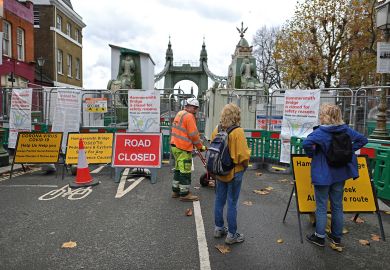Labour has swept to power in the UK, with universities now pushing incoming ministers to honour promises to “secure the future” of the sector.
Sir Keir Starmer’s party returned to Downing Street for the first time in 14 years after amassing a large majority of at least 160.
In a night of heavy Conservative losses, there was an effective clear-out of ministers covering the higher education sector, with science secretary Michelle Donelan – a former universities minister who earlier this year was forced to pay damages to an academic who she wrongly accused of expressing support for Hamas – losing Melksham and Devizes to the Liberal Democrats.
Education secretary Gillian Keegan was beaten by the Liberal Democrats in Chichester, while Luke Hall, who had been universities minister for barely three months, suffered the same fate in Thornbury and Yate.
On the Labour side, shadow education secretary Bridget Phillipson was the first MP of the night elected, holding Houghton and Sunderland South, and there were also victories for shadow higher education minister Matt Western in Warwick and Leamington and shadow science secretary Peter Kyle in Hove and Portslade. Shadow science minister Chi Onwurah topped the poll in Newcastle upon Tyne Central.
THE podcast: what does the UK election mean for higher education?
Nick Hillman, director of the Higher Education Policy Institute, said it had clearly been a “dire” night for the Tories, with “all sorts of records broken that they did not ever want to see broken”.
He said the Labour majority was “strange”, given how the party’s vote share overall had increased only marginally and had actually fallen in university seats such as Sheffield, Newcastle and Leeds, where turnout was also low. With many universities now on their summer holidays, many students may have chosen to vote at their home addresses instead.
The result also brings a host of new MPs with university backgrounds into the House of Commons. For Labour, Marie Tidball, a University of Oxford law researcher, won in Penistone and Stocksbridge; Kanishka Narayan, a former Stanford University innovation fellow, took the Vale of Glamorgan seat; economist Jeevun Sandher will be the next MP for Loughborough; and Durham University’s Sam Rushworth won in Bishop Auckland.
Queen Mary University of London law lecturer Paul Kohler won Wimbledon for the Liberal Democrats, and Calum Miller, a fellow at Oxford’s Blavatnik School of Government, was victorious in Bicester and Woodstock for the same party. Andrew Snowden, a former staff member at the University of Salford, won Fylde for the Conservatives.
During the six-week-long election campaign, Labour declined to rule out “bailouts” for institutions in trouble or raising tuition fees as it acknowledged the “crisis” in funding for higher education.
It now faces calls to act quickly amid fears that a university could go under, with a rescue or transition fund and a change in narrative on international students on the sector’s wish list, along with tackling the thorny issue of fees.
An inflationary rise to about £9,750 a year has been mooted by some sector leaders, but polling during the campaign from consultancy Public First showed that this was one of the least popular education policy options among voters.
Labour’s 133-page manifesto, published on 13 June, gave little detail as to where it was heading on funding questions but did outline various commitments relevant to universities, including closer integration with other forms of skills training and confirmation that short-term funding cycles for research and development would be scrapped in favour of 10-year budgets.
A Universities UK spokesperson welcomed the new government and said it “looks forward to working with them on our mutual priorities, which include supporting economic growth and productivity, and increasing opportunity for all”.
Alicia Greated, executive director of the Campaign for Science and Engineering, said the result gave Labour “a real opportunity to drive change in the UK” as she urged the party to work with the sector to ensure that research and development was used “to improve the lives and livelihoods of people across the UK”.
Attention will now turn to who is handed the key ministerial positions relevant to higher education. Ms Phillipson, who has served as shadow education secretary since 2021, was expected to be confirmed in the role in government.
The result spells the end of Conservative rule in the UK, although many of Rishi Sunak’s higher education policies may still be carried forward.
Next month, the Office for Students is set to gain new powers to regulate universities over free speech, thanks to legislation passed in the last parliament, and the new lifelong learning loan is due to come to fruition next year but could still be delayed.
Labour has signalled a change in approach from the outgoing administration, which had consistently pushed a narrative of “rip-off degrees” and encouraged alternative routes into careers as well as becoming embroiled in various culture war battles with the sector. Mr Kyle said during the campaign that the “war against universities” would end under Labour.
Register to continue
Why register?
- Registration is free and only takes a moment
- Once registered, you can read 3 articles a month
- Sign up for our newsletter
Subscribe
Or subscribe for unlimited access to:
- Unlimited access to news, views, insights & reviews
- Digital editions
- Digital access to THE’s university and college rankings analysis
Already registered or a current subscriber?








